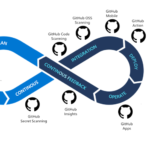Why GitHub is the Go-To Platform for Startups
For a Startup, agility, collaboration, and automation are non-negotiable. GitHub has emerged as the preferred platform for startups, offering a robust suite of tools for source code management, continuous integration/continuous deployment (CI/CD), team collaboration, and security. Whether you’re building your MVP or scaling your engineering team, GitHub’s features can power your journey from idea to production with speed and confidence.
This guide walks you through hosting your startup on GitHub, implementing a CI/CD pipeline from scratch, comparing Free and Enterprise plans, and providing a comprehensive checklist for effective development, automated deployment, feature tracking, and security.
Key Concepts: GitHub for Startups
- Source Code Management: GitHub repositories store and version your code, enabling seamless collaboration.
- CI/CD Automation: GitHub Actions automates building, testing, and deploying code, reducing manual errors and accelerating releases.
- Issue & Project Tracking: Built-in tools for bug tracking, feature requests, and project management.
- Security: Advanced features for code scanning, secret management, and compliance.
- Team Collaboration: Unlimited collaborators, pull requests, code reviews, and discussions.
Step-by-Step Guide: Setting Up GitHub and CI/CD Pipeline
1. Creating a GitHub Account and Organization
- Go to GitHub.com and click Sign up.
- Follow the prompts to create your personal account. Verify your email address to unlock all features.
Tip: Use a strong, unique password and enable two-factor authentication (2FA) for security.
Official Guide - For a startup team, create an Organization from your profile menu. This allows you to manage repositories, teams, and permissions centrally.
Getting Started with Your GitHub Account
2. Creating Your First Repository
- Inside your organization, click New repository.
- Give your repo a meaningful name (e.g.,
startup-app), add a description, and choose Private for internal projects. - Initialize with a README, .gitignore (choose your language), and a license if open source.
Hello World on GitHub
3. Setting Up Your Local Development Environment
- Clone the repository to your local machine:
- Initialize your project (e.g., Node.js):
- Create a
.gitignorefile to excludenode_modulesand other unnecessary files.
git clone https://github.com/your-org/startup-app.git
cd startup-appnpm init -y
npm install --save-dev eslint jest nodemon supertest
npm install express
4. Implementing CI/CD with GitHub Actions
GitHub Actions enables you to automate your build, test, and deployment workflows using simple YAML files in your repository. Here’s a practical setup:
Directory Structure
startup-app/
├── .github/
│ └── workflows/
│ ├── ci.yml
│ └── deploy.yml
├── src/
├── tests/
├── package.json
├── .gitignore
└── README.md
Sample CI Workflow (.github/workflows/ci.yml)
name: CI
on:
push:
branches: [main]
pull_request:
branches: [main]
workflow_dispatch:
jobs:
build-and-test:
runs-on: ubuntu-latest
strategy:
matrix:
node-version: [18.x, 20.x]
steps:
- uses: actions/checkout@v4
- name: Setup Node.js ${{ matrix.node-version }}
uses: actions/setup-node@v4
with:
node-version: ${{ matrix.node-version }}
cache: "npm"
- name: Install Dependencies
run: npm ci
- name: Run ESLint
run: npm run lint
- name: Run Tests
run: npm test
- name: Generate Test Coverage
run: npm run test -- --coverage
Sample CD Workflow (.github/workflows/deploy.yml)
name: Deploy to Vercel
on:
push:
branches: [main]
workflow_dispatch:
jobs:
deploy:
runs-on: ubuntu-latest
steps:
- uses: actions/checkout@v4
- name: Setup Node.js
uses: actions/setup-node@v4
with:
node-version: "20.x"
cache: "npm"
- name: Install Dependencies
run: npm ci
- name: Build
run: npm run build --if-present
- name: Deploy to Vercel
run: npx vercel --token ${{ secrets.VERCEL_TOKEN }} --prod --yes
Note: Store deployment tokens and secrets securely in GitHub’s Settings > Secrets and variables.
GitHub Hardening Guide
5. Visualizing and Monitoring Workflows
- Go to the Actions tab in your repo to see workflow runs, logs, and status.
- Click any workflow to drill down into job and step logs for debugging.
- Set up notifications for build failures or security alerts.
Real-World Example: OpenSauced Pizza
OpenSauced Pizza is a real-world project that leverages GitHub Actions for CI/CD. Their workflow includes automated testing, security scanning with CodeQL, and deployment to production using containers. This setup enables fast, safe releases and a scalable development process.
See their repo
Cost Comparison: Free vs. Enterprise Plans for Startups
| Feature | Free Plan | Enterprise Plan |
|---|---|---|
| Monthly Cost | $0 | $21/user/month (billed annually) |
| Private/Public Repos | Unlimited | Unlimited |
| Collaborators | Unlimited | Unlimited |
| CI/CD Minutes (Actions) | 2,000/month (private) | 50,000/month |
| Packages Storage | 500 MB | 50 GB |
| Security Features | Basic (Dependabot, 2FA) | Advanced Security, SAML SSO, Audit Logs |
| Support | Community | Premium |
| Compliance & Governance | Basic | SOC2, FedRAMP, Advanced Compliance |
| Central Management | No | Yes (Enterprise Account) |
Summary: The Free plan is suitable for most startups, offering unlimited repos and collaborators, with enough CI/CD minutes for moderate use. As your team grows or if you need advanced security, compliance, or higher CI/CD usage, consider moving to the Enterprise plan.
Official Pricing
Features for an 8-Member Startup Team on the Free Plan
- Unlimited public and private repositories
- Unlimited collaborators (no user cap)
- 2,000 CI/CD minutes per month for private repos (unlimited for public)
- 500 MB GitHub Packages storage
- GitHub Actions for workflow automation
- Pull requests, code reviews, protected branches
- Basic security alerts and Dependabot
- Issue and project tracking boards
- Community support
When to Upgrade:
- If you need more CI/CD minutes or packages storage
- Require advanced security (e.g., secret scanning, SAML SSO, audit logs)
- Need priority support or compliance certifications
- Centralized management of multiple organizations
Comprehensive Checklist for Effective GitHub Usage
Account & Organization
- Create personal and organization accounts
- Verify email addresses
- Enable two-factor authentication (2FA)
- Set up teams and roles within your organization
Repository Setup
- Initialize with README, .gitignore, and license
- Define branch protection rules (require reviews, prevent force-pushes)
- Enable signed commits for auditability
- Configure GitHub Actions for CI/CD
- Set up secrets for deployment (Settings > Secrets)
- Integrate code scanning and Dependabot
- Enable issue templates and pull request templates
Development Workflow
- Adopt feature branching (create a branch per feature/bug)
- Use pull requests for all changes
- Enforce code reviews and status checks
- Automate testing and linting in CI pipeline
- Monitor workflow runs and logs
Automated Deployment
- Set up CD workflows for staging and production
- Store deployment keys/tokens as secrets
- Use environment protection rules for production
- Monitor deployments through GitHub Actions and your cloud provider
Feature & Bug Tracking
- Use GitHub Issues for bug reports and feature requests
- Label, assign, and prioritize issues
- Track progress with GitHub Projects (Kanban boards)
- Integrate with external tools (e.g., Jira, Trello) if needed
Security Best Practices
- Enable 2FA for all members
- Use branch protection and review requirements
- Enable secret scanning and dependency alerts
- Regularly audit team access and permissions
- Monitor audit logs and activity history
- Educate team on secure development practices
Latest Tools, Technologies, and Frameworks
- GitHub Actions: Native CI/CD automation for all major languages and platforms
- CodeQL: Advanced code scanning for security vulnerabilities
- GitHub Packages: Host and manage private and public packages
- GitHub Copilot: AI-powered code suggestions for faster development
- Dependabot: Automated dependency updates and security alerts
- Third-party integrations: Slack, Jira, Vercel, AWS, Azure, and more
Challenges and Solutions for Startup Teams
-
Challenge: Limited CI/CD minutes on Free plan
Solution: Optimize workflows, use public repos for open source, or purchase additional minutes as needed. -
Challenge: Managing secrets and sensitive data
Solution: Store all secrets in GitHub’s encrypted Secrets manager; never commit secrets to code. -
Challenge: Ensuring code quality and security
Solution: Enforce code reviews, enable automated testing, and use security scanning tools. -
Challenge: Scaling team collaboration
Solution: Use teams, roles, and permissions; adopt clear branching and review policies.
Future Outlook: What’s Next for Startups on GitHub?
- AI-powered development with GitHub Copilot and Copilot Workspace
- Deeper integrations with cloud providers for seamless deployments
- More granular security controls and compliance features
- Enhanced project management and automation tools
- Growing ecosystem of GitHub Marketplace actions and integrations
Conclusion: Key Takeaways
- GitHub’s Free plan is powerful enough for most startup teams, offering unlimited repos, collaborators, and built-in CI/CD.
- Implementing CI/CD with GitHub Actions streamlines development, testing, and deployment.
- Security and collaboration features can be enhanced as your needs grow, with clear upgrade paths to Enterprise plans.
- Following a comprehensive checklist ensures your team is set up for fast, secure, and reliable software delivery.
Ready to supercharge your startup’s development workflow? Contact us today to get expert guidance and hands-on support for your GitHub setup and CI/CD automation!
References & Further Reading
- Creating an Account on GitHub
- How to Build a CI/CD Pipeline with GitHub Actions
- GitHub Pricing
- GitHub Hardening Guide
- GitHub Enterprise Pricing Guide
- GitHub Team or Free? How to Choose the Right Plan
- Building Custom CI/CD Pipelines with GitHub Actions
- How to use GitHub Bug Reporting
- GitHub Pricing - Actual Prices
- GitHub Security Checklist
- Hello World - GitHub Docs
- Book: Accelerate: The Science of Lean Software and DevOps by Nicole Forsgren, Jez Humble, and Gene Kim



